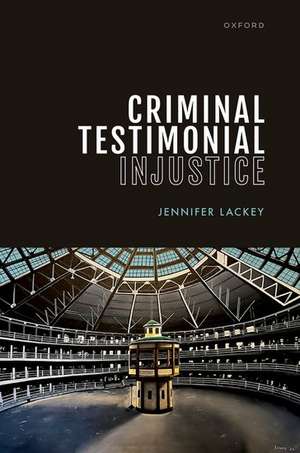Criminal Testimonial Injustice
Autor Jennifer Lackeyen Limba Engleză Hardback – apr 2023
Preț: 376.75 lei
Preț vechi: 519.12 lei
-27% Nou
Puncte Express: 565
Preț estimativ în valută:
72.11€ • 74.99$ • 60.34£
72.11€ • 74.99$ • 60.34£
Carte tipărită la comandă
Livrare economică 04-10 martie
Preluare comenzi: 021 569.72.76
Specificații
ISBN-13: 9780192864109
ISBN-10: 0192864106
Pagini: 224
Dimensiuni: 165 x 240 x 20 mm
Greutate: 0.49 kg
Editura: OUP OXFORD
Colecția OUP Oxford
Locul publicării:Oxford, United Kingdom
ISBN-10: 0192864106
Pagini: 224
Dimensiuni: 165 x 240 x 20 mm
Greutate: 0.49 kg
Editura: OUP OXFORD
Colecția OUP Oxford
Locul publicării:Oxford, United Kingdom
Recenzii
With the combination of incisive analysis, straightforward prose, and fierce passion that has become her trademark, Jennifer Lackey argues that the American criminal justice machine uses coerced speech to systematically undermine the epistemic agency of defendants-and by extension, the pursuit of truth and the very nature of law itself. This is a troubling and deeply important work by one of the most important epistemologists now working.
As someone whose own credibility has been targeted in the American criminal legal system, and who has repeatedly suffered epistemic injustice, I gratefully applaud Professor Lackey's groundbreaking and viscerally moving analysis of the ugliness committed by law enforcement, prosecutors, and some criminal defense lawyers in undermining the supposed search for truth and justice in courtrooms across our nation.
Jennifer Lackey's Criminal Testimonial Injustice is a systematic indictment of America's criminal legal system. With extraordinary care and rigor, and a background of justified moral outrage, Lackey draws on a detailed knowledge of criminal law and case history to lay out the myriad ways in which our criminal legal system wages epistemic war on those accused of crimes. This work is a framework altering contribution to the analytic tradition in philosophy.
Jennifer Lackey's Criminal Testimonial Injustice is a revelation, a fresh philosophical take on false confessions and other causes of wrongful convictions. Many false confessors beat themselves up for ceding the truth about their innocence in favor of a pressurized false narrative of guilt constructed by police officers. The indignity of letting someone else narrate your life and then having to watch this false narrative control your life for decades as your case winds itself through the criminal justice system is perhaps the most painful aspect of false confessions. Professor Lackey has given me a new vocabulary to describe it—it's the ultimate denial of a person's 'epistemic agency.'
Lackey identifies a form of epistemic injustice that she reveals as endemic in the US criminal justice system. The resulting critique is as compelling as it is far-reaching.
As someone whose own credibility has been targeted in the American criminal legal system, and who has repeatedly suffered epistemic injustice, I gratefully applaud Professor Lackey's groundbreaking and viscerally moving analysis of the ugliness committed by law enforcement, prosecutors, and some criminal defense lawyers in undermining the supposed search for truth and justice in courtrooms across our nation.
Jennifer Lackey's Criminal Testimonial Injustice is a systematic indictment of America's criminal legal system. With extraordinary care and rigor, and a background of justified moral outrage, Lackey draws on a detailed knowledge of criminal law and case history to lay out the myriad ways in which our criminal legal system wages epistemic war on those accused of crimes. This work is a framework altering contribution to the analytic tradition in philosophy.
Jennifer Lackey's Criminal Testimonial Injustice is a revelation, a fresh philosophical take on false confessions and other causes of wrongful convictions. Many false confessors beat themselves up for ceding the truth about their innocence in favor of a pressurized false narrative of guilt constructed by police officers. The indignity of letting someone else narrate your life and then having to watch this false narrative control your life for decades as your case winds itself through the criminal justice system is perhaps the most painful aspect of false confessions. Professor Lackey has given me a new vocabulary to describe it—it's the ultimate denial of a person's 'epistemic agency.'
Lackey identifies a form of epistemic injustice that she reveals as endemic in the US criminal justice system. The resulting critique is as compelling as it is far-reaching.
Notă biografică
Jennifer Lackey is the Founding Director of the Northwestern Prison Education Program. Lackey is the winner of the Dr. Martin R. Lebowitz and Eve Lewellis Lebowitz Prize for Philosophical Achievement and Contribution, and she has received grants and fellowships from the John Simon Guggenheim Memorial Foundation, the Andrew W. Mellon Foundation, the American Council of Learned Societies, and the National Endowment for the Humanities.
